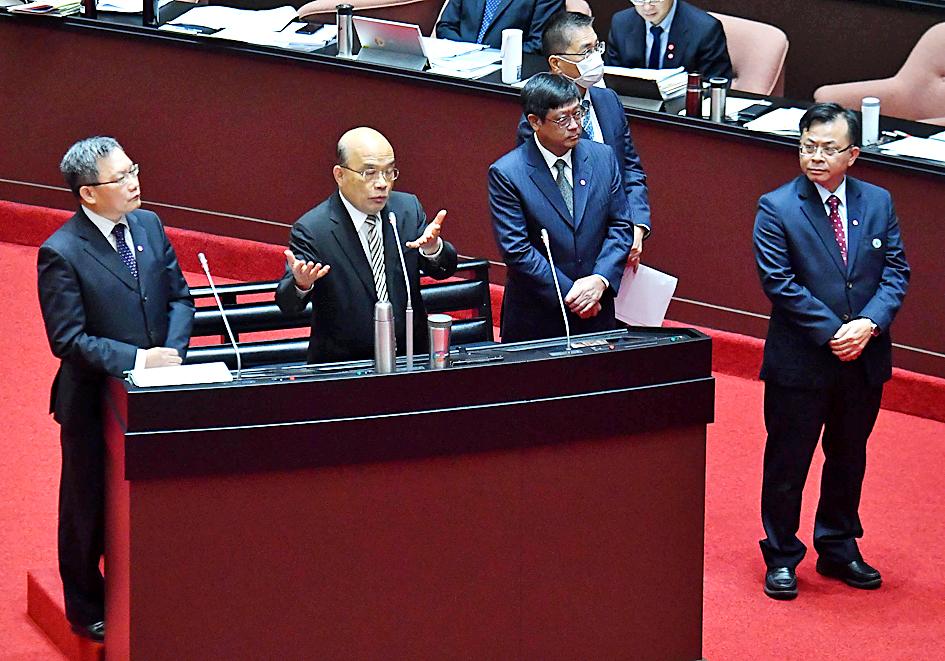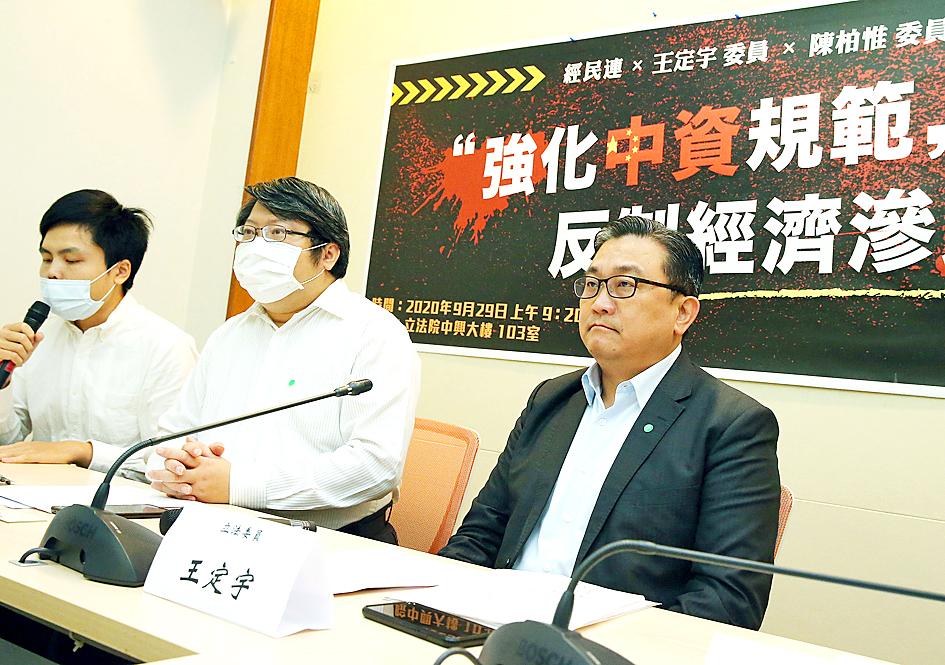The government would investigate claims that no university has ever been punished for signing letters affirming Beijing’s “one China” principle, and handle infractions appropriately, Premier Su Tseng-chang (蘇貞昌) said yesterday.
“Academic exchanges should not come with political preconditions,” Su told reporters at the Legislative Yuan in Taipei.
In March 2017, Shih Hsin University was found to have signed an agreement with three Chinese universities to refrain from discussing any “sensitive political topics” in courses or activities attended by Chinese students.

Photo: CNA
The Ministry of Education said at the time that 72 of the nation’s 157 tertiary institutions had signed similar letters since 2005.
However, a recent investigation by the ministry found that no school has ever been penalized for signing such letters, since universities are self-administered.
Democratic Progressive Party (DPP) legislators Wang Ting-yu (王定宇) and Chao Tien-lin (趙天麟) have proposed amending the Act Governing Relations Between the People of the Taiwan Area and the Mainland Area (兩岸人民關係條例) to tackle China’s “united front” tactics.

Photo: CNA
There is a loophole in the section that governs cross-strait educational exchanges, Wang said on Monday.
Article 33-3 states that schools must apply for permission before “forming any coalition or engaging in any other cooperative activity or any written agreement” with a Chinese institution, Wang said.
Under the proposed amendment, the article would be changed to clarify that restricted activities include “concluding a coalition, written agreement or cooperative activity, or a unilateral agreement or declaration,” he said.
The second paragraph would be changed to say that exchanges must not “involve any content of a political nature” to they must not “involve cooperation with united front political objectives of the Mainland area,” he said.
The proposal would also amend Article 90-2 to require authorities to cut off financial assistance or restrict enrollment for schools found guilty of contravening the provisions.
“China wants to eliminate our nation’s sovereignty,” he said. “How can Taiwanese schools allow other countries to use the ‘one China’ principle to limit academic exchange and education?”
Amending the law would protect teachers from Chinese coercion and ensure that schools report infractions to the ministry, Wang added.
“Taiwan already bans political and military entities from school campuses, how could it allow the Chinese Communist Party to sneak its way in?” he said.
Taiwan Statebuilding Party Legislator Chen Po-wei (陳柏惟) yesterday told reporters that he supports the proposals, because while China claims it is not creating conflict with other nations, it is accustomed to using “united front” tactics against Taiwan.
While Chinese missiles cannot annihilate, Beijing seeks to use psychological, cultural, educational and other tactics to “win over” Taiwan, Chen said.

AIR SUPPORT: The Ministry of National Defense thanked the US for the delivery, adding that it was an indicator of the White House’s commitment to the Taiwan Relations Act Deputy Minister of National Defense Po Horng-huei (柏鴻輝) and Representative to the US Alexander Yui on Friday attended a delivery ceremony for the first of Taiwan’s long-awaited 66 F-16C/D Block 70 jets at a Lockheed Martin Corp factory in Greenville, South Carolina. “We are so proud to be the global home of the F-16 and to support Taiwan’s air defense capabilities,” US Representative William Timmons wrote on X, alongside a photograph of Taiwanese and US officials at the event. The F-16C/D Block 70 jets Taiwan ordered have the same capabilities as aircraft that had been upgraded to F-16Vs. The batch of Lockheed Martin

US President Donald Trump yesterday announced sweeping "reciprocal tariffs" on US trading partners, including a 32 percent tax on goods from Taiwan that is set to take effect on Wednesday. At a Rose Garden event, Trump declared a 10 percent baseline tax on imports from all countries, with the White House saying it would take effect on Saturday. Countries with larger trade surpluses with the US would face higher duties beginning on Wednesday, including Taiwan (32 percent), China (34 percent), Japan (24 percent), South Korea (25 percent), Vietnam (46 percent) and Thailand (36 percent). Canada and Mexico, the two largest US trading

GRIDLOCK: The National Fire Agency’s Special Search and Rescue team is on standby to travel to the countries to help out with the rescue effort A powerful earthquake rocked Myanmar and neighboring Thailand yesterday, killing at least three people in Bangkok and burying dozens when a high-rise building under construction collapsed. Footage shared on social media from Myanmar’s second-largest city showed widespread destruction, raising fears that many were trapped under the rubble or killed. The magnitude 7.7 earthquake, with an epicenter near Mandalay in Myanmar, struck at midday and was followed by a strong magnitude 6.4 aftershock. The extent of death, injury and destruction — especially in Myanmar, which is embroiled in a civil war and where information is tightly controlled at the best of times —

China's military today said it began joint army, navy and rocket force exercises around Taiwan to "serve as a stern warning and powerful deterrent against Taiwanese independence," calling President William Lai (賴清德) a "parasite." The exercises come after Lai called Beijing a "foreign hostile force" last month. More than 10 Chinese military ships approached close to Taiwan's 24 nautical mile (44.4km) contiguous zone this morning and Taiwan sent its own warships to respond, two senior Taiwanese officials said. Taiwan has not yet detected any live fire by the Chinese military so far, one of the officials said. The drills took place after US Secretary